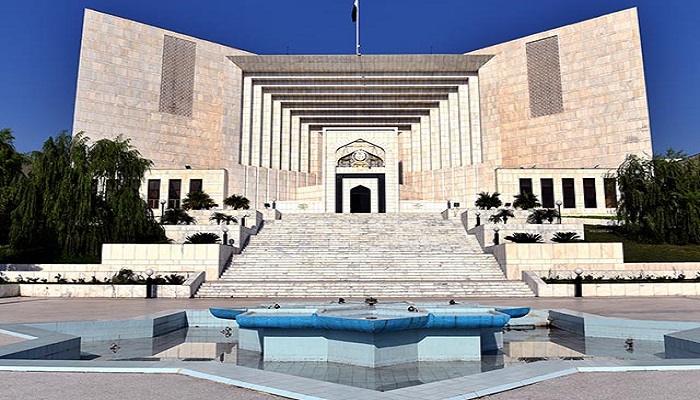The Supreme Court (SC) on Thursday remarked that Under Article 95, every member of the Assembly has the right to vote.
The apex court larger bench conducted the hearing on presidential reference seeking interpretation of Article 63-A.
Read more: Supreme Court: PML-N terms presidential reference ‘premature, unnecessary’
During the hearing, the apex court asked the Attorney General for Pakistan whether provinces should also be made party in the reference.
The AGP replied that the provinces had nothing to do with the no-confidence motion as no move had been submitted against any chief minister in the country.
However, the court issued notices to all provinces and political parties and remarked that it wanted all parties to stand in defense of the Constitution.
Chief Justice of Pakistan Justice Umar Ata Bandial while directing the provinces to submit their written replies, said that conducting hearings on presidential reference would be easier after their replies.
Talking about the JUI-F planned protest and sit-in, the Attorney General said that as per law no sit-in can be staged during the process of voting. Every campaign should be ended before 48 hours in elections, he maintained.
The AGP requested the court to issue directions for peaceful protests.
The Chief Justice asked all political parties to respect democratic values and to stand up for the Constitution.
Justice Mazhar Alam remarked that the formation of a tiger force armed with sticks by Pakistan Tehreek-e-Insaf (PTI) was regrettable.
Justice Ijaz-ul-Ahsan remarked that the purpose of the democratic process was not to affect daily affairs.
The AGP argued that under Article 63A, members are bound by party instructions. The members can only follow party policy on the PM election and no-confidence motion.
Justice Jamal Khan Mandokhel asked for the disqualification mentioned in Article 63A.
The AGP replied that the heading of Article 63A is related to disqualification. The procedure for disqualification is clear in the constitution. Articles 62-63-63A cannot be read separately. The court has declared the parliamentary system as the basic structure of the Constitution.
He further said that articles 17 and 18 give ordinary citizens the right to vote freely. Ordinary citizens and members of the Assembly want to differentiate between votes. The rules for voting for ordinary citizens and members of the Assembly are different.
Justice Ijaz-ul-Ahsan remarked that this issue was also raised in the Senate Election reference.
The AGP said that political parties are the foundation of this system. The court observed in the past to prevent deviation from party policy. The court said that Pakistan would not have been formed if the Muslim League had not functioned as a party. Political parties legislate for the people in the House, he added.
Justice Jamal Khan Mandokhel said that the right to vote belongs to the members of the Assembly and not to the members of the party.
Justice Ijaz-ul-Ahsan remarked that members of the Assembly must observe party discipline on four occasions. Article 63A was introduced to make party discipline mandatory.
Justice Muneeb Akhtar remarked that political parties are institutions. Violation of discipline weakens institutions. If the party line is not adhered to, the political party will be destroyed.
The AGP said that elections were held in 1985 on a non-partisan basis. Muhammad Khan Junejo had to become party president to become prime minister.
The Chief Justice remarked that political and legal motives for violating party discipline are different. The political implication is that the member will not get a ticket again.
Justice Jamal Mandokhel asked to what extent the party discipline is restricted.
The AGP replied that if the party is not being listened to then he can resign. After resigning, the Member of Assembly can go public again.
Justice Ijaz-ul-Ahsan remarked that candidates know when they can vote that they cannot vote freely.
The Chief Justice remarked that the one who jumps in the second boat has to wash his hands from the seat.
Justice Ijaz-ul-Ahsan remarked that now that the Pandora’s Box has been opened, the musical chair will continue.
The AGP said that it’s not just about the Article 63A sword, it’s about the whole system failing.
Justice Muneeb Akhtar said if everyone did their own thing, the political party would not become an institution.
Later, the court adjourned the hearing till Friday.
Read more: Fawad condemns PML-N for launching campaign against SC bench hearing Article 63-A reference
The Supreme Court Bar Association (SCBA) has also submitted its reply in the Supreme Court which stated that members of National Assembly cast their votes on no-confidence motion in their individual capacity and as per Article 95 of the Constitution vote is not right of any political party.
The SCBA reply states that the members cannot be barred from voting under Article 63(A) as the public runs the government through their elected representatives. Article 63 does not disqualify members for voting against party directions.
Jamiat Ulema-e-Islam-Fazl (JUI-F) in its reply submitted in apex court states that the Speaker of the House cannot be given the authority to reject the vote of members of the Parliament.
The JUI-F also claimed that if the Members of National Assembly (MNA) are disqualified for life on the grounds of voting against their party, it will further weaken the already weak democracy of Pakistan.
The PML-N in its reply submitted in SC states that Article 63A and Article 95 are clear and every lawmaker has the right to vote. The vote of every MNA will be counted and that filing of the presidential reference is a premature and unnecessary move. The apex court “has the authority to interpret the Constitution but not to amend it.”



















